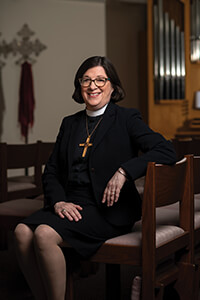Music is personal and universal
May 7, 2021
I had a friend in high school who said, “Wouldn’t it be great if our lives had a soundtrack and we could hear it?” That way we would always know what was coming at us. Suspenseful music, ominous music, joyful music, sorrowful music, heroic music—all would alert us to what is just around the corner and would accompany us on our way. There is something intriguing about the idea. And it could work if your soundtrack were the only one and everyone and everything else were just the supporting cast in your musical.
But God didn’t create us that way. We aren’t solitary lives played out on an isolated stage. God created us by love and for love. We were meant to be together. The Trinity is relationship and God welcomes us into that holy company.
Like God’s love, music is at the same time deeply personal, sounding deep within an individual’s soul, and universal, ringing out to an entire community. Like God’s love, music sings to us in all of our marvelous diversity. Just as the beauty of creation is apparent not in monochrome but in Technicolor, so also must music be polyphonic. This is why we have a variety of worship resources that include a variety of musical styles from many cultures and in many languages.
One of the great harms done by Western missionaries was to equate proper, acceptable and God-pleasing worship with Western music, dress and even instrumentation. The problem wasn’t the introduction of their music. The problem was the replacement of Indigenous expression with Western music and the labeling of Indigenous music, language, dance and dress as pagan and worse.
Like God’s love, music is at the same time deeply personal, sounding deep within an individual’s soul, and universal, ringing out to an entire community.
One of my greatest honors in this call was being asked to preach on Easter Sunday at a Lutheran church in Yunnan Province, China. The Chinese characters that convey “Lutheran” actually mean “Justification Church.” On that Easter morning, high up in the mountains, we sang our praise and thanks to God for the victory of the Resurrection. These were Lisu people. They are an ethnic minority pushed out of the fertile valleys by the Han people.
Then the missionaries came. As the Justification Church, we believe and teach that the gospel is the message of redemption, reconciliation and liberation for all people. Instead, the Western missionaries took away the Lisu people’s music and culture. An elder of the community explained to us that this service would be the first time in a century that the Lisu people worshiped God with their own music, their own instruments, with their own dance, in their own traditional clothing.
I didn’t understand the language (sermons could take three times as long—I preached in English, which a second person translated into Mandarin and then a third person translated into Lisu) and the music didn’t resonate with me at first, but I recognized the song. It was the song of Resurrection. The style was unique to the Lisu people, but the music was universal.
Martin Luther, a musician and hymn writer, wanted his people to hear the universal message of the gospel in their own language. We Lutherans take a great deal of pride in Luther’s translation of the Bible into the vernacular. How is it that we are not so ready to hear the gospel in the musical vernacular of the thousand tongues that sing our great Redeemer’s praise? Music, in all its many forms, sings for us even when we can’t find the words. I like to think that, when the Spirit intercedes for us with sighs too deep for words, the Spirit is singing and, in that distant melody, just beyond our comprehension, our longing and God’s love meet.
My life flows on in endless song; above earth’s
lamentation, I catch the sweet, though far-off hymn
that hails a new creation.
No storm can shake my inmost calm while to that Rock I’m clinging. Since Christ is Lord of heaven and earth, how can I keep from singing? (ELW, 763).


